Related Research Articles

Eau Claire County is a county located in the U.S. state of Wisconsin. As of the 2020 census, the population was 105,710. Its county seat is Eau Claire. The county took its name from the Eau Claire River.

Chippewa Falls is a city located on the Chippewa River in Chippewa County, Wisconsin, United States. The population was 14,731 in the 2020 census. Incorporated as a city in 1869, it is the county seat of Chippewa County. The city's name originated from its location on the Chippewa River, which is named after the Ojibwe. It is a principal city of the Eau Claire–Chippewa Falls metropolitan area.
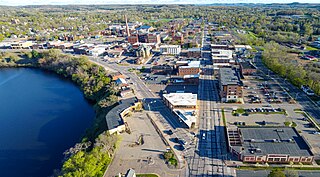
Menomonie is a city in and the county seat of Dunn County in the western part of the U.S. state of Wisconsin. The city's population was 16,843 as of the 2020 census.

John James Jenkins was an English American immigrant, lawyer, judge, and Republican politician. He served seven terms as a member of the United States House of Representatives, representing northwest Wisconsin, and served one year as United States district judge for the District of Puerto Rico.
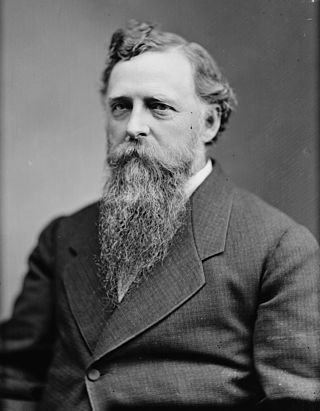
Thaddeus Coleman Pound was an American businessman from Wisconsin who served in both houses of the Wisconsin legislature, as the tenth Lieutenant Governor of Wisconsin, and as a U.S. Representative (1877–1883). His brother was Albert Pound, who also served in the Wisconsin Assembly. He was the grandfather of poet Ezra Pound.
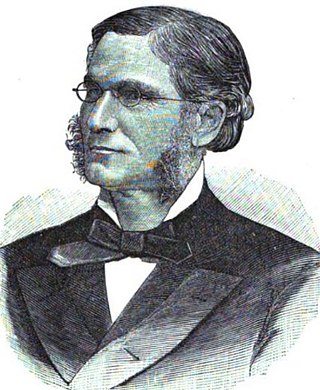
Herman Loin Humphrey was an American attorney, judge, and Republican politician. He served three terms in the United States House of Representatives, representing Wisconsin's 7th congressional district (1877–1883). Prior to his election to Congress, he was a Wisconsin circuit court judge for ten years in western Wisconsin, and served two years in the Wisconsin State Senate. Some sources give his middle name as Leon.
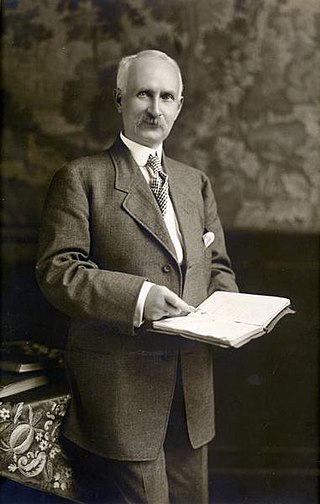
Thomas Jefferson Cunningham was an American newspaper publisher, historian, and politician. He was the 14th Secretary of State of Wisconsin, and served three years as mayor of Chippewa Falls, Wisconsin. He was a prominent member of the Democratic Party of Wisconsin and was a delegate to every Democratic National Convention from 1880 and 1940. In his role as Secretary of State, he was the namesake for a set of Wisconsin Supreme Court decisions, known as the "Cunningham cases", which set legal standards in the state for redistricting.
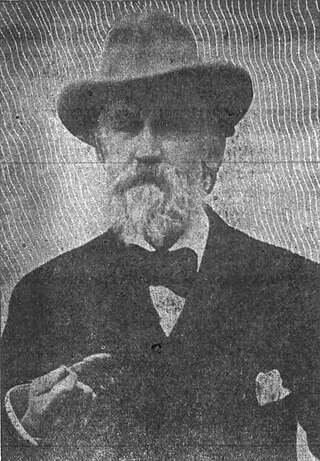
Henry Cleveland Putnam was an American philanthropist and lumber baron in the Chippewa Valley of Wisconsin, also serving as a member of the Wisconsin State Forestry Commission. In Eau Claire, he is known as H. C. Putnam and is regarded as one of the founders of the city. He donated the land for the eponymous Putnam Park in Eau Claire.
Warren Petryk is an American Republican politician in the Wisconsin State Assembly. He has been a member of the Assembly since 2011, representing Pierce County, Pepin County, and parts of Eau Claire, Dunn, St. Croix, and Buffalo counties. He has been the Chair of Assembly Committee on Workforce Development since 2015.
La Verne George Ausman was an American farmer and Republican politician from Dunn County, Wisconsin. He served as administrator of the U.S. Farmers Home Administration during the presidency of George H. W. Bush, and was the 4th secretary of the Wisconsin Department of Agriculture, Trade and Consumer Protection. He also served two terms in the Wisconsin State Assembly, representing the 69th Assembly district.
The 28th Senate district of Wisconsin is one of 33 districts in the Wisconsin Senate. Located in southeast Wisconsin, the district comprises southeast Waukesha County and northwest Racine County. It includes the cities of Muskego, New Berlin, and most of the city of Waukesha, along with the villages of Big Bend, Mukwonago, and Waterford.
Knapp, Stout & Co. was a lumber company based in Menomonie, Wisconsin in the 19th and early 20th centuries. The company was established in 1846, when John Holly Knapp and William Wilson purchased half of interest in a lumber mill on the Red Cedar River from David Black; it was originally known as Black & Knapp. Later Andrew Tainter acquired a quarter-interest, and the company has become Knapp-Tainter Lumber Company. Henry Stout bought a quarter interest in the company in 1853, and its name became Knapp, Stout & Company. The company's location allowed it to control the lumber industry in the region, and by 1870 it controlled the logging industry in the Red Cedar River valley. In 1878, the company incorporated, and its official name became the Knapp, Stout & Co., Company. The company employed over 2,000 workers in the Menomonie area and produced 85 million board feet of lumber on average yearly from 1871 to 1896; its output made it the largest lumber company in the world. In the 1880s, the company expanded to sites along the Mississippi River, opening offices in Dubuque, Iowa, Read's Landing, Minnesota, and St. Louis. By the 1900s, the company had largely depleted its lumber supply; it closed many of its camps and dissolved early in the 20th century. The company sent out its last shipment of lumber on August 12, 1901.
Carl Martin Grimstad was a pioneer in Dakota Territory and a dairy farmer in the state of Wisconsin. He also served as a member of the Wisconsin State Assembly.
William Millar, Sr., was a Scotch-Irish American immigrant, farmer, and Wisconsin pioneer. He was a member of the Wisconsin State Senate and Assembly (1887), representing Dunn County. His last name was spelled Miller in some historical sources.
William Henry Fitzgerald (1848–1922) was a member of the Wisconsin State Assembly.
Cadwallader Jackson Wiltse was a member of the Wisconsin State Assembly.
Julius G. Ingram was a member of the Wisconsin State Assembly.
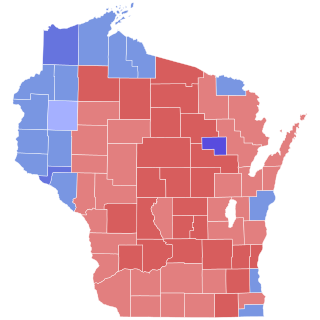
The 1978 Wisconsin gubernatorial election was held on November 7, 1978. Republican Lee S. Dreyfus won the election with 54% of the vote, winning his first term as Governor of Wisconsin and defeating incumbent Democrat Martin J. Schreiber. Bob Kasten unsuccessfully sought the Republican nomination.

The 1914 Wisconsin gubernatorial election was held on November 3, 1914. Primary elections were held on September 1, 1914.
Jedediah Wilder Granger was an American farmer, Republican politician, and pioneer settler of Iowa and South Dakota. He was a member of the Wisconsin State Assembly, representing Chippewa and Dunn counties in the 1870 session.
References
- ↑ Forrester, George (1891). Historical and Biographical Album of the Chippewa Valley, Wisconsin including a general historical sketch of the Chippewa Valley; ancestral records of leading families; biographies of representative citizens, past and present; and portraits of prominent men. Chicago, Illinois: A. Warner. p. 876.
- ↑ Curtiss-Wedge, F.; Jones, Geo. (1925). History of Dunn County, Wisconsin. H.C. Cooper, Jr. & Co. pp. 347–349.
- ↑ The Blue Book of the State of Wisconsin (18th ed.). Madison, Wis.: David Atwood. 1879. p. 491.